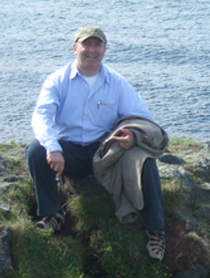 Dion Dionysiou is professor of environmental engineering and science at the University of Cincinnati, US, where he works on advanced oxidation technologies for water treatment.
Dion Dionysiou is professor of environmental engineering and science at the University of Cincinnati, US, where he works on advanced oxidation technologies for water treatment.
What inspired you to go into science?
After my national service in the army I studied chemical engineering at the National Technical University in Athens, Greece. I enjoyed both the engineering and chemistry courses. I also worked hard to improve my English at this time because I really wanted to go to the US for graduate studies.
I gained a place at Tufts University, Massachusetts, and my masters thesis focused on developing de-icing materials for roads, particularly crystallisation of environmentally friendly de-icing solutions, for example, calcium magnesium acetate. I then worked for W. R. Grace & Co. to develop masonry materials and later went on to the University of Cincinnati, Ohio, where initially my PhD dealt with developing perovskite materials for gas separations and advanced materials for energy applications.
What made you switch to studying water?
I always wanted to work with water related issues, ever since being a child in Cyprus where there was a major issue of water scarcity. When I was quite young, people in my small town in Cyprus had to get water each day from fountains in their neighbourhoods because we didn’t have a direct supply to the house. This experience has made me especially interested in water conservation and water supply.
Why did you focus on advanced oxidation technologies in water treatment?
During my PhD I moved into the field of environmental engineering and studied photocatalysis for water purification, which was funded by the Center of International Research for Water and the Environment (Centre International de Recherche Sur l’Eau et l’Environnement) of ONDEO Services. Around this time, in 1996, there was an international conference on advanced oxidation technologies, which took place in Cincinnati. Photocatalysis was one of the processes covered, along with various other methods that interested me. I was a student helper that first year and every year after that I aimed to present some of my work at that particular meeting.
Within your field, what is the next big thing?
Advanced oxidation is an area of tremendous growth as a means of treating wastewater for reuse in irrigation or even for human consumption. Singapore is a very good example of where such technologies are being used. Here in southern California, membrane microfiltration is one approach. Reverse osmosis and combined UV-hydrogen peroxide treatments are also used.
Water availability in developing countries is another very important topic. Many communities don’t have access to clean water and large numbers of people die from water borne diseases. Water forms an integrated cycle: wastewater when discharged into rivers or lakes ultimately becomes a source of drinking water. So clearly the content of pharmaceutical and other compounds in water must be regulated. Eutrophication of water resources, which leads in many cases to the formation of harmful algal blooms and associated cyanotoxins, should also be eliminated or at least minimised.
Another developing area concerns the analytical methods needed to detect compounds of emerging concern. New compounds are being introduced into the water system and their biological and chemical breakdown products need to be identified and their toxicity understood.
There are also new materials being developed for use in water treatment. Nanomaterials can be involved in removal of pollutants from water, but may in turn enter the water themselves. There is a need to predict and monitor what happens to these materials. Photocatalytic materials, for example, have nano components that can leach out and the effects of pH and other factors on these in the complex matrix of water need to be understood in order to see the whole picture.
What advice would you give to a young person who is considering a career in science?
I think there are tremendous opportunities with respect to a career in science and engineering and I would encourage young people to explore these opportunities. Discovery is a beautiful thing. I would also encourage them to be creative and motivated. I believe young people are smarter than we are, and we should do all we can as educators of the next generation to help provide opportunities for these young people.
What would you do differently if you had the chance?
I would focus more on chemistry. I am a chemical engineer and work on materials for environmental applications, but if I had the chance again I would go deeper into the fundamentals, into basic science, simply because I like it. I enjoy understanding something in depth. For example, in environmental engineering you are often dealing with a very complex system: water and water treatment involve complex interactions – microbes, natural organic matter, chemical oxidants and inorganic chemicals. I enjoy discovering the mechanistic aspects of these interactions.
What I enjoy about engineering is that you can solve problems for humanity. To purify and recycle water is a very valuable thing to do. In Cyprus we have desalination plants but they are expensive and so working to develop better membranes to deliver water recycling at reduced cost is good to do. When scientists and engineers work together, that’s great.
When you’re not doing science and engineering, what do you like doing?
I enjoy my involvement with publishers and I take my editorial and refereeing responsibilities very seriously. I also love watching soccer, particularly European soccer – I’m a big fan. I don’t play soccer anymore, but I have two daughters who both play here in the US.
For the original interview article see Chemistry World










